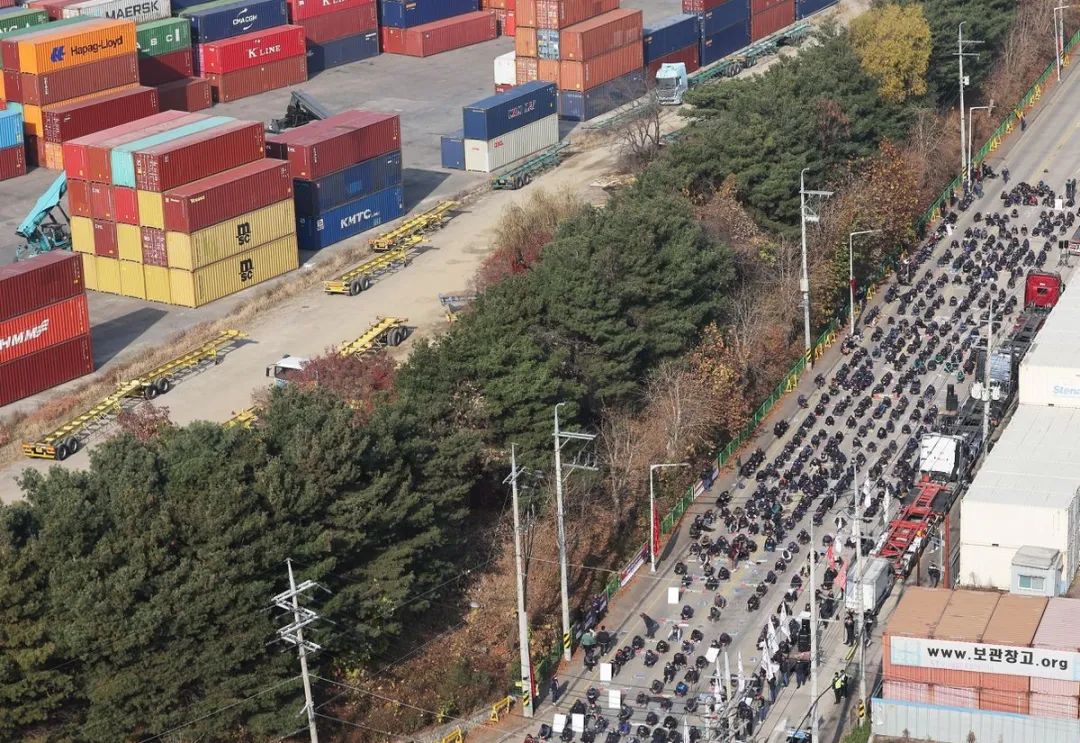It is reported that on November 24th, the Korean freight truck worker Unity Alliance (CTSU) began a national endless strike, and about 22,000 truck drivers participated in it. They stated that they would refuse to transport goods and interrupt the manufacturing and fuel supply from automotive to petrochemical industries.
This is the second major strike of the union this year. In June, thousands of truck drivers in June have a 8 -day national strike that causes a loss of about 1.2 billion US dollars to the country, leading to large -scale delays in transportation of goods. Some factories have been forced to reduce production. Daily throughput of multiple ports dropped sharply.
Trade organizers said they will start from the entrance of the main logistics centers in the metropolitan area of Seoul and other key areas, including Busan and Guangyang in the southwest.
This morning, the trade union held 16 rallys across South Korea, including the Ulshan Port where the main manufacturing factories of modern vehicles were. Outside the country's largest port Busan Port, police and cars lined up on the main routes.
The main organizer of CTSU warned that the strikes are expected to interrupt the oil supply of the main refinery and the transportation of major ports and industrial factories. According to union estimates, about 22,000 truck drivers participated in the strike, and there were also unreasonable non -union members to join.
The chairman of the union said on Thursday: "Except for stopping all logistics in South Korea, we have no choice."

On November 24, in front of a transportation hub in southern South Korea, the union truck driver shouted the slogan during the rally and started strike.
It is reported that with the rise in fuel costs, the truck driver calls on the government to permanently do a minimum wage system called "safety freight". This system will expire at the end of this year. At the same time, the government is required to expand the coverage of the system. Industry truck driver.
The South Korean government stated that it would extend the system for three years, but refused to accept the requirements of the union, which is about to expand these welfare to truck drivers with high income industries such as fuel and steel.
According to the Yonhap News Agency, the continuous strike will lead to a serious interruption of the supply of automobiles, steel and oil refining industries, forcing manufacturers to reduce daily output. A large industrial park located in Puxiang City has interrupted transportation, and the goods entering and leaving the park are delayed.
Minister of Land and Transportation of South Korea said that if a truck driver does not return to his job, the Ministry of Land and Resources will seek an administrative order that stops strike as soon as next week, and emphasizes that the government cannot accept the requirements of truck drivers.
South Korean Prime Minister said: "The rejection of the union will not only cause logistics paralysis, but also bring irreversible losses to the national economy."
Some companies including modern iron, petrochemical companies and a battery manufacturer said that because the strikes are expected, emergency orders have been shipped out, and necessary raw materials have been prepared in advance. However, due to the restrictions on storage space and logistics, problems will occur if the strike continues.
A spokesman for modern iron -making said that the company's daily steel product was transported about 8,000 tons of steel products in Puxiang. Due to the strike of truck drivers, these goods could not be shipped today.
It is reminded that the cargo generation owners who have recently traded in South Korea have timely communicated with customers and paid close attention to the delay and influence of this strike on the transportation of cargo transportation.
Previous:Los Angeles and Changtan Port outer backlog container ships are clear!
Next:Freight fell back to the rise point! The small peak season before the Spring Festival of the Spring